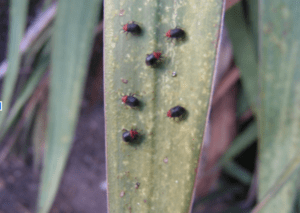Yucca Plant Bugs
Yucca plant bugs are a type of true bug (order Hemiptera) related to sucking pests such as stink bugs and leaf-footed bugs. Hemiptera have a gradual life cycle with three life stages- egg, nymph, and adult. Immatures, or nymphs, look similar to adults but do not have fully developed wings, which makes them appear more orange in color. Adult yucca plant bugs have a reddish-orange head and thorax and dark bluish-black wings. 
Immature and adult yucca plant bugs feed on plants by using their piercing-sucking mouthparts to suck out plant juices. This results in yellow spotting on foliage. Heavy infestations that are left for long periods of time can weaken or even kill infested plants.
Yucca plant bugs can sometimes be a challenge to manage because when someone approaches an infested plant, the bugs move quickly into the center of the yucca to hide. Make sure to get thorough coverage of pesticide on the plant to ensure that the insects come in contact with the pesticide. Treatment should begin with insecticidal soap as this product should handle the bulk of the problem without harming beneficial insects. Other pesticide choices include active ingredients such as horticultural oil (during cooler times of the year), azadirachtin (neem), pyrethrins, bifenthrin, or cyfluthrin.

For more information or help with identification, contact Wizzie Brown, Texas A&M AgriLife Extension Service Program Specialist at 512.854.9600. Check out my blog at www.urban-ipm.blogspot.com
This work is supported by Crops Protection and Pest Management Competitive Grants Program [grant no. 2017-70006-27188 /project accession no. 1013905] from the USDA National Institute of Food and Agriculture.
The information given herein is for educational purposes only. Reference to commercial products or trade names is made with the understanding
that no discrimination is intended and no endorsement by Texas A&M AgriLife Extension Service Extension or the Texas A&M AgriLife Research is implied.
The Texas A&M AgriLife Extension Service provides equal access in its programs, activities, education, and employment, without regard to race, color, sex,
religion, national origin, disability, age, genetic information, veteran status, sexual orientation or gender identity.




You must be logged in to post a comment.